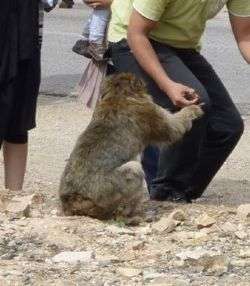Don't feed the monkeys—why your generosity is harming their health

Tourists who feed wild monkeys in Morocco are risking the health of an endangered species by making them larger, more susceptible to disease, and more stressed, according to new research.
Behavioural ecologists compared the health of two groups of wild Barbary macaques in Ifrane National Park in the Atlas Mountains, Morocco; one which spent nearly 50 per cent of their feeding activity eating food provided by humans, and another which rarely encounter tourists and instead relied on natural food resources.
The macaques which ate food from tourists were found to have poorer quality fur, with some patches of alopecia, and also suffered from higher levels of stress hormones compared with the other group.
All the females in the non-fed group gave birth, but only a third of females in the groups of Barbary macaques frequently fed by tourists had babies. The monkeys which relied on natural food were observed to only suffer one incident of a stomach upset, while the group which received large amounts of food from tourists had 32 bouts of illness.
The study also found that the effects of feeding by tourists were different depending on sex; while males did not differ between groups in body size and fur quality, the females fed by tourists had larger body sizes, but better coat quality. However, the males suffered more from alopecia and higher stress levels. The findings are published today in the prestigious journal, PLOS ONE.
The study was led by Dr Laëtitia Maréchal as part of her PhD at the University of Roehampton. Dr Maréchal, now a post-doctoral fellow in the School of Psychology, University of Lincoln, UK, said: "Barbary macaques are an endangered species and recently tourism was proposed as a potential tool for the conservation of this species in Morocco. But such tourism is currently unregulated, and feeding is a common practice; therefore regulating tourist provisioning may improve animal welfare.
"We assessed the primates' health using a range of non-invasive measures, such as birth and survival rates, the quality of their fur, body size, occurrence of injury and disease, and stress hormone levels in faecal samples. Our findings support previous research which indicates that wildlife tourism, and particularly so-called 'tourist provisioning', has negative impacts on the health of wild animals.
"The study suggests that measures need to be taken to avoid causing more harm to an already endangered species. We are confident that changes will soon be made to regulate wildlife tourism in Morocco, as the Moroccan authorities and the local community have supported our study. Now tourists who encounter wildlife need to be informed that feeding wild animals is harmful, and so they should not do it."
The paper, Assessing the effects of tourist provisioning on the health of wild Barbary macaques in Morocco, can be found in PLOS ONE.
More information: Laëtitia Maréchal et al. Assessing the Effects of Tourist Provisioning on the Health of Wild Barbary Macaques in Morocco, PLOS ONE (2016). DOI: 10.1371/journal.pone.0155920
Journal information: PLoS ONE
Provided by University of Lincoln

















